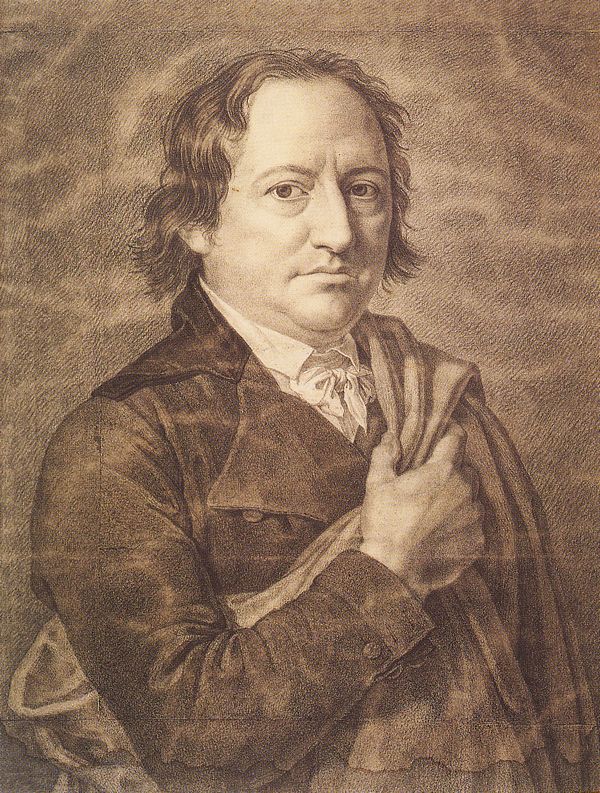 |
|
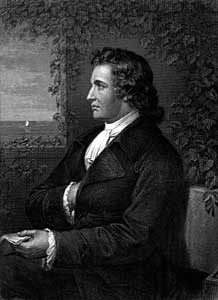
|
"As if whipped by invisible spirits, the sun steeds of time run away with the light charriot of our destiny, and nothing
remains to us but to hold onto the reins with calm courage, steering the wheels, now right, now left, from the stone here
and the abyss there. Where it carries is -- who knows? One hardly remembers whence once came." ~Goethe (from "Egmont")
Johann
Wolfgang von Goethe (1749-1832) is one of the titans of world literature [and my favorite writer]. His works (each a masterpiece in its own right) are diverse in their themes and
ideas, spanning many literary movements. He was
truly a renaissance man - poet, novelist, playwright, philosopher, scientist, and a public official, holding the post of an
advisor to the Duke of Weimar. His characters are developed to such fullness and realism that it seems that all
of them are the main characters, so unique and unforgettable are their personalities.
Goethe's first work is "Gotz von Berlichingen", a play
written in 1773, in the spirit of the German literary movement known as "Storm and Stress"(the forerunner of German Romanticism).
It glorifies liberty and the rebellion against authority, using as the setting the oppressive Middle Ages. Next
year, as a result of an unhappy love affair, Goethe wrote "The Sufferings of Young Werther"(1774), the first important novel
of modern German literature, whose main theme is the conflict of the ideal and the reality. In 1780s, Goethe visited Rome and studied classical art, architecture, and literature, which
initiated his Classical literary period. Upon his return, he wrote two dramas, "Egmont"(1788) and "Torquato Tasso"(1790),
that follow the Greek discipline of ideas and form. "Egmont" has the same theme as "Gotz", but the fury of Storm and Stress
is here replaced with greater reasoning and reserve. "Torquato Tasso", autobiographical to some extent, elaborates on the
conflict presented in "Werther" [see more on "Tasso" below.] Goethe's next important work is his novel "Wilhelm Meister's
Apprenticeship"(1796), the "cure" for the inability to cope with the everyday life. In it, he presents romantic characters
in the real world, calling for the harmonious fusion of the elevated and the mundane. In 1808, he published the first
part of his poetic drama "Faust".
Goethe's other major works include the novels "Elective
Affinities"(1809) and "Wilhelm Meister's Travels"(1821), as well as the second part of "Faust" (published poshumously in 1832).
"Faust" is Goethe's greatest literary acheivement, on which he worked for 60 years. It is an allegory on human life and celebrates
humanity and individualism.
The poems below have been translated by Edwin H. Zeydel; the fragment from "Faust" was translated by George Madison Priest.
The paintings on this page (except for the blue horizon) are by Sir Edward Burne-Jones, a Pre-Raphaelite British artist who
sought out the mysteries and hidden spirit in his country's legends and folkore. The painting in the bottom left column in
the Faust part is called "Light and Color", painted by John M. W. Turner... a British Romantic artist and visual alchemist,
and believe it or not, this is not a watercolor but oil on canvas!
|
|
The Harper's Song II(from "Wilhelm Meister's Apprenticeship")
Wer nie sein Brot mit Tränen aß,
Wer nie die kummervollen Nächte
Auf seinem Bette weinend saß,
Der kennt euch nicht, ihr himmlischen Mächte!
Ihr führt in's Leben uns hinein,
Ihr laßt den Armen schuldig werden,
Dann überlaßt ihr ihn der Pein:
Denn alle Schuld rächt sich auf Erden.
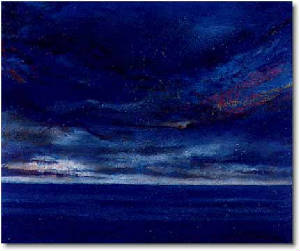
To the Distant One
And have I lost thee evermore,
Hast thou, oh, fair one, from me flown?
Still in mine ear sounds, as of yore,
Thine every word, thine every tone.
As when at morn the wanderer's eye
Attempts to pierce the air in vain,
When, hidden in the azure sky,
The lark high o'er him chants his strain:
So do I cast my troubled gaze
Through bush, through forest, o'er the lea;
Thou art invoked by all my lays;
Oh, come then, loved one, back to me!
[poem in the original:]
An Die Entfernte
So hab´ ich wirklich dich verloren?
Bist du, o Schöne, mir entflohn?
Noch klingt in den gewohnten Ohren
Ein jedes Wort, ein jeder Ton.
So wie des Wandrers Blick am Morgen
Vergebens in die Lüfte dringt,
Wenn in dem blauen Raum verborgen,
Hoch über ihm die Lerche singt:
So dringet ängstlich hin und wider
Durch Feld und Busch und Wald mein Blick –
Dich rufen alle meine Lieder:
O komm, Geliebte, mir zurück!
On the Lake
I drink fresh nourishment, new blood
From out this world more free;
The Nature is so kind and good
That to her breast clasps me!
The billows toss our bark on high,
And with our oars keep time,
While cloudy mountains tow'rd the sky
Before our progress climb.
Say, mine eye, why sink'st thou down?
Golden visions, are ye flown?
Hence, thou dream, though golden-twin'd;
Here, too, love and life I find.
Over the waters are blinking
Many a thousand fair star;
Gentle mists are drinking
Round the horizon afar.
Round the shady creek lightly
Morning zephyrs awake,
And the ripen'd fruit brightly
Mirrors itself in the lake.

[one of the most beautiful poems in all of German language...]
Mignons Lied
Kennst du das Land, wo die Zitronen blühn,
Im dunkeln Laub die Gold-Orangen glühn,
Ein sanfter Wind vom blauen Himmel weht,
Die Myrte still und hoch der Lorbeer steht?
Kennst du es wohl?
Dahin! dahin
Möcht ich mit dir, o mein Geliebter, ziehn.
Kennst du das Haus? Auf Säulen ruht sein Dach.
Es glänzt der Saal, es schimmert das Gemach,
Und Marmorbilder stehn und sehn mich an:
Was hat man dir, du armes Kind, getan?
Kennst du es wohl?
Dahin! dahin
Möcht ich mit dir, o mein Beschützer, ziehn.
Kennst du den Berg und seinen Wolkensteg?
Das Maultier sucht im Nebel seinen Weg;
In Höhlen wohnt der Drachen alte Brut;
Es stürzt der Fels und über ihn die Flut!
Kennst du ihn wohl?
Dahin! dahin
Geht unser Weg! O Vater, laß uns ziehn!
(translation)
Knowest thou the land where lemon blossom grows,
In foliage dark the golden orange glows,
A gentle breeze blows from the azure sky,
Still stands the myrtle, and the laurel, high?
Dost know it well?
'Tis there! 'Tis there
Would I with thee, oh my beloved, fare.
Knowest thou the house: on columns rest its beams,
Its hall glows bright and every chamber gleams,
And marble figures stand and gaze at me:
What have men done, oh wretched child, to thee?
Dost know it well?
'Tis there! 'Tis there
Would I with thee, oh my protector, fare.
Knowest the mountain with the misty shrouds?
The mule is seeking passage through the clouds;
In caverns dwells the dragons' ancient brood;
The cliff rocks plunge under the rushing flood!
Dost know it well?
'Tis there! 'Tis there
Our pathway lies! Oh father, let us fare.
|
|
 |
 |
 |
 |
|
The Harper's Song I (ibid.)
The man who yields to solitude,
Is all too soon alone.
Men live and love as is their mood
And leae him there to groan.
Yes, let me keep my woe!
When once I can but go
In solitude, unknown,
I shall not be alone.
A lover will steal to listen and see
Is the girl he loves alone?
Thus day and night woe silently
Insnares me, lonesome one,
To torture lonesome me.
Ah, when at last I'll be
Beneath the burial stone,
Will grief leave me alone.
[the poem in the original: ]
Harfenspieler
Wer sich der Einsamkeit ergibt,
Ach! der ist bald allein;
Ein jeder lebt, ein jeder liebt,
Und läßt ihn seiner Pein.
Ja! laßt mich meiner Qual!
Und kann ich nur einmal
Recht einsam sein,
Dann bin ich nicht allein.
Es schleicht ein Liebender lauschend sacht,
Ob seine Freundin allein?
So überschleicht bei Tag und Nacht
Mich Einsamen die Pein,
Mich Einsamen die Qual.
Ach, werd' ich erst einmal
Einsam im Grabe sein,
Da läßt sie mich allein!
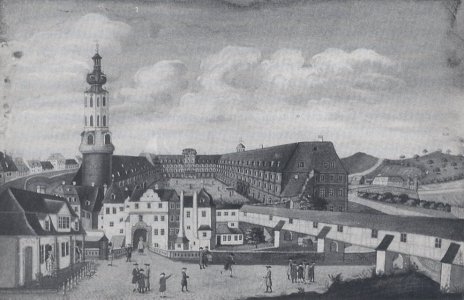
(The historic Weimar, Goethe's town of choice . His next poem posted below is a warm-hearted celebration of and tribute to
the culture of Weimar and Jena, and their university students' life)
Die Lustigen von Weimar
Donnerstag nach Belvedere,
Freitag geht's nach Jena fort:
Denn das ist, bei meiner Ehre,
Doch ein allerliebster Ort!
Samstag ist's, worauf wir zielen,
Sonntag rutscht man auf das Land;
Zwäzen, Burgau, Schneidemühlen
Sind uns alle wohlbekannt.
Montag reizet uns die Bühne;
Dienstag schleicht dann auch herbei,
Doch er bringt zu stiller Sühne
Ein Rapuschchen frank und frei.
Mittwoch fehlt es nicht an Rührung:
Denn es gibt ein gutes Stück;
Donnerstag lenkt die Verführung
Uns nach Belveder' zurück.
Und es schlingt ununterbrochen
Immer sich der Freudenkreis
Durch die zweiundfunfzig Wochen,
Wenn man's recht zu führen weiß.
Spiel und Tanz, Gespräch, Theater,
Sie erfrischen unser Blut;
Laßt den Wienern ihren Prater;
Weimar, Jena, da ist's gut!
The Violet
A violet in the meadow grew,
With drooping head, whom no one knew;
It was a charming flower.
A shepherd maid was making her way
With sprightly step and spirits gay
Along, along,
Across the field with song.
Ah, mused the violet, could I be
The fairest flower to grace the lea
For, ah, the shortest hour,
Till by this lovely maid I'm found
And to her bosom crushed and bound!
Could, could I be
For one brief quarter hour!
But oh, but oh, the maiden trod
The violet into the sod,
Saw not the humble flower.
It sank and died in joy complete:
And if I die, my death I meet
Through her, through her,
Beneath her very feet.
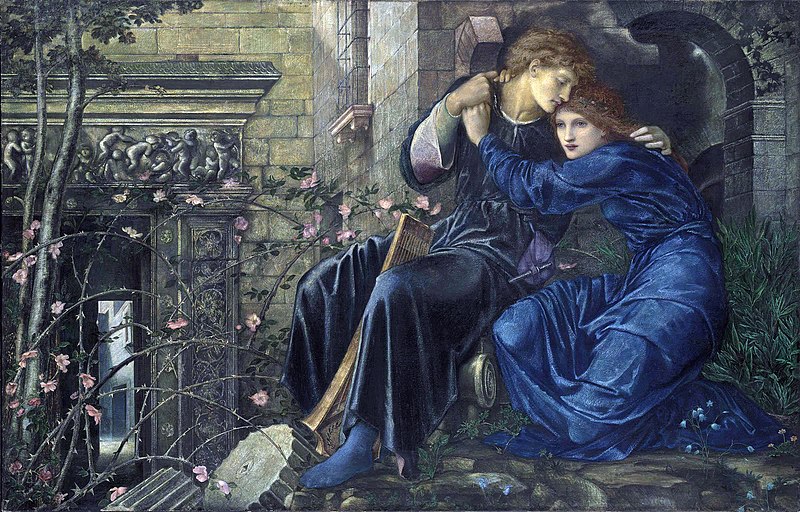
Trost in Tränen
Wie kommts, daß du so traurig bist,
Da alles froh erscheint?
Man sieht dirs an den Augen an,
Gewiß, du hast geweint.
»Und hab ich einsam auch geweint,
So ists mein eigner Schmerz,
Und Tränen fließen gar so süß,
Erleichtern mir das Herz.«
Die frohen Freunde laden dich,
O komm an unsre Brust!
Und was du auch verloren hast,
Vertraue den Verlust.
»Ihr lärmt und rauscht und ahnet nicht,
Was mich, den Armen quält.
Ach nein, verloren hab ichs nicht,
So sehr es mir auch fehlt.«
So raffe denn dich eilig auf,
Du bist ein junges Blut.
In deinen Jahren hat man Kraft
Und zum Erwerben Mut.
»Ach nein, erwerben kann ichs nicht,
Es steht mir gar zu fern.
Es weilt so hoch, es blinkt so schön,
Wie droben jener Stern.«
Die Sterne, die begehrt man nicht,
Man freut sich ihrer Pracht,
Und mit Entzücken blickt man auf
In jeder heitern Nacht.
»Und mit Entzücken blick ich auf,
So manchen lieben Tag;
Verweinen laßt die Nächte mich,
Solang ich weinen mag.«

Wonne der Wehmut
Trocknet nicht, trocknet nicht,
Tränen der ewigen Liebe!
Ach, nur dem halbgetrockneten Auge
Wie öde, wie tot die Welt ihm erscheint!
Trocknet nicht, trocknet nicht,
Tränen unglücklicher Liebe!
|
|
 |
 |
 |
|
|
 |
|
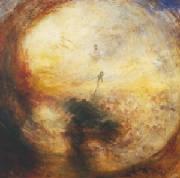
Below is the prelude to "FAUST", which Goethe wrote in 1808. it is an allegorical debate between a theater manager,
a poet, and an actor, on how poetry should be presented to the world.
The Manager is a pragmatic, worldly man - he represents the masses. He sees art as entertainment and thinks that it should
conform to the audience's level. He wants to give the people what they want: a mediocre crowd-pleaser.
The Poet, on the other hand, does not want to conform to wishes of the masses. He feels that poetry is the Ideal and cannot
be adjusted to people - rather, they should elevate themselves to its level. He sees poetry as an ABSOLUTE ART, not entertainment
- it is a sublime product of poet's imagination and individuality, and therefore cannot conform to the mediocre wishes of
the masses.
The solution to this conflict is the Actor. He is the bridge between the poet and the audience, between imagination and
the world, between Ideal and reality. He urges the poet to use his talents and present his high poetic ideas in a way that
common people could understand, through spectacle, parables and symbols. This would not be conformity, but simply a clarification
of those ideas.
Here is the text itself:
PRELUDE ON THE STAGE
THEATRE MANAGER. DRAMATIC POET. COMIC ACTOR.
MANAGER: Ye two that have so often stood by me
In time of need and tribulation,
Come, say: what hope in any German nation
For what we undertake have ye?
I much desire to give the crowd a pleasure,
In chief, because they live and let us live.
The posts, the boards are up, and here at leisure
The crowd expects a feast in what we'll give.
They're sitting now with eyebrows raised,
Quite calmly there, would gladly be amazed.
I know how one can make all minds akin,
Yet so embarrassed I have never been.
In truth, accustomed to the best they're not,
But they have read a really awful lot.
How shall we plan that all be fresh and new
And with a meaning, yet attractive too?
For I do like to see them crowding, urging,
When toward our booth the stream sets in apace
And with its powerful, repeated surging
Pours through the strait and narrow gate of grace,
When still in broad daylight, ere it is four,
They fight and push their way up to the wicket
And as the famine-stricken at the baker's door
They nearly break their necks to get a ticket.
This miracle, upon such varied folk, the poet
Alone can work; today, my friend, oh, show it!
POET: I beg you, of that motley crowd cease telling
At sight of whom the spirit takes to flight!
Enveil from me the billowing mass compelling
Us to its vortex with resistless might.
No, lead me to the tranquil, heavenly dwelling
Where only blooms for poets pure delight,
Where Love and Friendship give the heart their blessing,
With godlike hand creating and progressing.
Ah, all that from the bosom's depths sprang flowing,
All that from shy and stammering lips has passed,
Sometimes success and sometimes failure knowing,
To each wild moment's power a prey is cast.
Oft only after years, in credit growing,
Doth it appear in perfect form at last.
What gleams is born but for the moment's pages;
The true remains, unlost to after-ages.
ACTOR: Could I but hear no more of after-ages!
Suppose the thought of them my mind engages,
Who'd give the present world its fun?
That will it have and ought to have it too.
The presence of a gallant chap, revealed to you,
I think, is also worth while being shown.
Who pleasantly can just himself impart,
Is not embittered by the people's whim;
He likes to have a crowd surrounding him,
More certainly to stir and thrill each heart.
So do be good, show you can set the fashion.
Let Fantasy be heard with all her chorus:
Sense, Reason, Sentiment, and Passion;
Yet mark you well! bring Folly too before us!
MANAGER: But, more than all, do let enough occur!
Men come to look, to see they most prefer.
If, as they gaze, much is reeled off and spun,
So that the startled crowd gapes all it can,
A multitude you will at once have won;
You then will be a much-loved man.
You can compel the mass by mass alone;
Each in the end will seek out something as his own.
Bring much and you'll bring this or that to everyone
And each will leave contented when the play is done.
If you will give a piece, give it at once in pieces!
Ragout like this your fame increases.
Easy it is to stage, as easy to invent.
What use is it, a whole to fashion and present?
The Public still will pick it all to pieces.
POET: You do not feel how bad such handiwork must be,
How little that becomes the artist true!
I see, neat gentlemanly botchery
Is now a sovereign rule with you.
MANAGER: Reproof like this leaves me quite unoffended!
A man who does his work, effectively intended,
Must stick to tools that are the best for it.
Reflect! You have a tender wood to split;
And those for whom you write, just see!
If this one's driven hither by ennui,
Another leaves a banquet sated with its vapours;
And- what the very worst will always be-
Many come fresh from reading magazines and papers.
Men haste distraught to us as to the masquerade,
And every step but winged by curiosity;
The ladies give a treat, all in their best arrayed,
And play their part without a fee.
Why do you dream in lofty poet-land?
Why does a full house make you gay?
Observe the patrons near at hand!
They are half cold, half coarse are they.
One, when the play is over, hopes a game of cards;
A wild night on a wench's breast another chooses.
Why then, with such an aim, poor silly bards,
Will you torment so much the gracious Muses?
Give only more and ever, ever more, I say.
Then from the goal you nevermore can stray.
Seek to bewilder men- that is my view.
But satisfy them? That is hard to do.-
What is attacking you? Pain or delight?
POET: Go hence and seek yourself another slave!
What! Shall the poet take that highest right,
The Right of Man, that Right which Nature gave,
And wantonly for your sake trifle it away?
How doth he over every heart hold sway?
How doth he every element enslave?
Is it not the harmony that from his breast doth start,
Then winds the world in turn back in his heart?
When Nature forces lengths of thread unending
In careless whirling on the spindle round,
When all Life's inharmonic throngs unblending
In sullen, harsh confusion sound,
Who parts the changeless series of creation,
That each, enlivened, moves in rhythmic time?
Who summons each to join the general ordination,
In consecrated, noble harmonies to chime?
Who bids the storm with raging passion lower?
The sunset with a solemn meaning glow?
Who scatters Springtime's every lovely flower
Along the pathway where his love may go?
Who twines the verdant leaves, unmeaning, slighted,
Into a wreath of honour, meed of every field?
Who makes Olympus sure, the gods united?
That power of Man the Poet has revealed!
ACTOR: Then use these handsome powers as your aid
And carry on this poet trade
As one a love-adventure carries!
By chance one nears, one feels, one tarries!
And, bit by bit, one gets into a tangle.
Bliss grows, then comes a tiff, a wrangle;
One is enrapt, now one sees pain advance,
And ere one is aware, it is a real romance!
So let us also such a drama give!
Just seize upon the full life people live!
Each lives it though it's known to few,
And grasp it where you will, there's interest for you.
In motley pictures with a little clarity,
Much error and a spark of verity,
Thus can the best of drinks be brewed
To cheer and edify the multitude.
Youth's fairest bloom collects in expectation
Before your play and harks the revelation.
Then from your work each tender soul, intent,
Absorbs a melancholy nourishment.
Then now one thought and now another thought you start;
Each sees what he has carried in his heart.
As yet they are prepared for weeping and for laughter;
They still revere the flight, illusion they adore.
A mind once formed finds naught made right thereafter;
A growing mind will thank you evermore.
POET: Then give me back the time of growing
When I myself was growing too,
When crowding songs, a fountain flowing,
Gushed forth unceasing, ever new;
When still the mists my world were veiling,
The bud its miracle bespoke;
When I the thousand blossoms broke,
Profusely through the valleys trailing.
Naught, yet enough had I when but a youth,
Joy in illusion, yearning toward the truth.
Give impulse its unfettered dower,
The bliss so deep 'tis full of pain,
The strength of hate, Love's mighty power,
Oh, give me back my youth again!
ACTOR: Youth, my good friend, you need most in the fight
When enemies come on, hard pressing,
When, clinging to your necks so tight,
The dearest maidens hang caressing,
When, from afar, a wreath entrances,
Luring to hard-won goal the runner's might,
When, after madly whirling dances,
A man carousing drinks away the night.
But on the lyre's familiar strings
To play with grace and spirit ever
And sweep with lovely wanderings
Toward goals you choose for your endeavour,
That is your duty, aged sirs,
And we revere you for it no less dearly.
Age makes not childish, as one oft avers;
It finds us still true children merely.
MANAGER: Words have been interchanged enough,
Let me at last see action too.
While compliments you're turning- idle stuff!
Some useful thing might come to view.
Why talk of waiting for the mood?
No one who dallies ever will it see.
If you pretend you're poets- good!
Command then, poets, poetry!
What we're in need of, that full well you know,
We want to sip strong drink, so go
And start the brew without delay!
Never is done tomorrow what is not done today
And one should let no day slip by.
With resolution seize the possible straightway
By forelock and with quick, courageous trust;
Then holding fast you will not let it further fly
And you will labour on because you must.
Upon our German stage, you are aware,
Each tries out what he wishes to display,
So in your work for me today
Scenes, mechanism you are not to spare.
Use both the lights of heaven, great and small;
The stars above are yours to squander;
Nor water, fire, nor rocky wall,
Nor beasts nor birds are lacking yonder.
Thus in our narrow house of boards preside
And on through all Creation's circle stride;
And wander on, with speed considered well,
From Heaven, through the world, to Hell!
|
|
 |
|
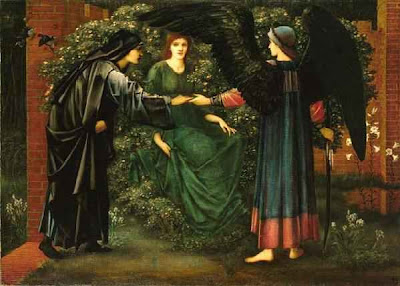
Goethe's "Torquato Tasso" is a deeply psychological play about the great Italian Renaissance poet at the court
of Alphonso II, his patron. At the center of the drama is the conflict between the inner, personal world and the
reality of life, between poet and society, between imagination and practicality. The play is written in the strict
classical form to stress the restraint and reason of society; the people of the court demonstrate complete coolness and reserve.
Conversely, Tasso is all passion, his feelings raging within him and overflowing. Though the play follows the iambic pentameter
pattern, in some of Tasso's lines this structure breaks up to emphasize his nonconformity. The people he is surrounded
by do not despise him - on the contrary, they value him and his poetic works. The tragedy is caused by simple misunderstanding,
the clash of different temperaments. The court people criticize Tasso's excessive introspection; he, in turn - their total
enslavement to the present. They want Tasso to have a greater restraint, expecting him to face reality and life's
issues; he has to make the 1st step and understand that life demands practical reasoning: you have to adapt to it and not
vise versa. But the restraint of his feelings also implies restraining his inner world of the self, the very source of his
inspiration-- to him, this is unthinkable. He wants them to accept him as he is, to understand that he cannot be otherwise.
His acuteness of feelings, his turbulent nature make him who he is- it is a bold expression of his own individuality.
Following the manner of Classicism, the play has almost no external action, but it is so absorbing that the "lack" remails
unnoticeable. Everything here is writen with greatest economy of words, and none of the speeches or events
deviate from the main theme. The drama forms one tightly-knit whole, with great psychological intensity.
This makes it difficult to select an excerpt that would "stand its own" out of its context, but here is one I could find
(translated by Charles E. Passage):
The world is fair indeed, its wide expanse
Traversed both far and near by so much good.
How sad that it forever
seems to draw
Away from us by just a single step
And lure our anxious yearning on through life,
Step after step,
up to our very graves!
It is so rare that human beings find
What seemed to have been theirs by destiny,
So rare
that they can ever hold and keep
What once their fortunate hands have seized upon!
What first submitted to us, wrenches
free
And we relinquish what so avidly
We grasped. There's happiness; we know it not
Or, knowing, know not how
to prize it.
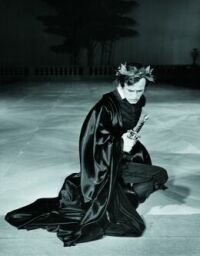
|
| Klaus Kinski as Torquato Tasso, in a 1956 production |

Erl-king
(english translation by Natalia MacFerren)
Who rides through the night o'er woodland wild?
It is a father with his young child;
The boy lies folded, close in his arm
He holds him steady and safe from harm.
"My son, thou hidest thy face as in fear.”
"The Erlking father, see he is near!
With Crown and Scepter and snow white shroud;"
"My son, 'tis but a passing cloud."
"My gentle boy, Oh come with me;
I'll sport and play the day long with thee;
And wondrous flowers shalt thou behold
And a garment shalt thou wear all of Gold."
"My father, my father, Oh dost thou not hear,
What Erlking whispers so soft in mine ear?"
"Nay, fear not, it is nothing my child,
The leaves but rustle sharp o'er the wild."
"Thou gentle boy wilt thou with me go?
My daughters all pretty pastimes know,
My daughters nightly their gay revels keep,
They'll dance and they'll sing and they'll rock thee to sleep.
“My father, my father, I feel sore afraid
See Erlking's daughters in yon dark shade?”
"My son, my son, I see it full well;
The grey knotted willows bend to the gale."
"I love thee, child, in vain wouldst thou now be perverse,
For if thou art not willing, I'll take thee by force;"
"My father! My father! His cold hand I feel!
Erlking has hurt me; With grasp of steel!"
The father shuddering; gives spur to his steed,
Holds his darling and groans in his need;
He reached his home in doubt and dread,
With-in his fond arms the child lay dead.

[the haunting original...]
Der Erklonig
Wer reitet so spät durch Nacht und Wind?
Es ist der Vater mit seinem Kind;
Er hat den Knaben wohl in dem Arm,
Er faßt ihn sicher, er hält ihn warm.
"Mein Sohn, was birgst du so bang dein Gesicht?"
"Siehst, Vater, du den Erlkönig nicht?
Den Erlenkönig mit Kron und Schweif?"
"Mein Sohn, es ist ein Nebelstreif."
"Du liebes Kind, komm, geh mit mir!
Gar schöne Spiele spiel' ich mit dir;
Manch' bunte Blumen sind an dem Strand,
Meine Mutter hat manch gülden Gewand."
"Mein Vater, mein Vater, und hörest du nicht,
Was Erlenkönig mir leise verspricht?"
"Sei ruhig, bleib ruhig, mein Kind;
In dürren Blättern säuselt der Wind."
"Willst, feiner Knabe, du mit mir gehn?
Meine Töchter sollen dich warten schön;
Meine Töchter führen den nächtlichen Reihn,
Und wiegen und tanzen und singen dich ein."
"Mein Vater, mein Vater, und siehst du nicht dort
Erlkönigs Töchter am düstern Ort?"
"Mein Sohn, mein Sohn, ich seh es genau:
Es scheinen die alten Weiden so grau."
"Ich liebe dich, mich reizt deine schöne Gestalt;
Und bist du nicht willig, so brauch ich Gewalt."
"Mein Vater, mein Vater, jetzt faßt er mich an!
Erlkönig hat mir ein Leids getan!"
Dem Vater grauset's, er reitet geschwind,
Er hält in Armen das ächzende Kind,
Erreicht den Hof mit Müh' und Not;
In seinen Armen das Kind war tot.
|
|
|
|











